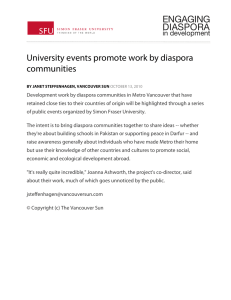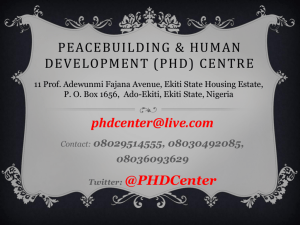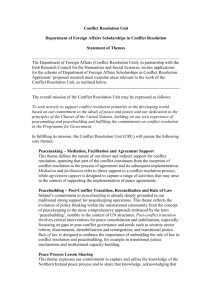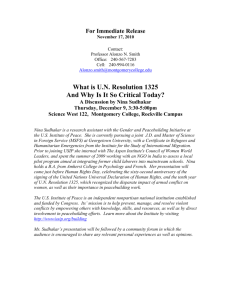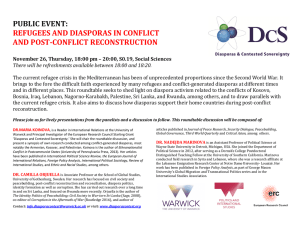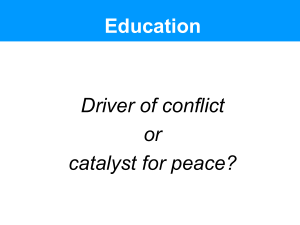Document 13955243
advertisement
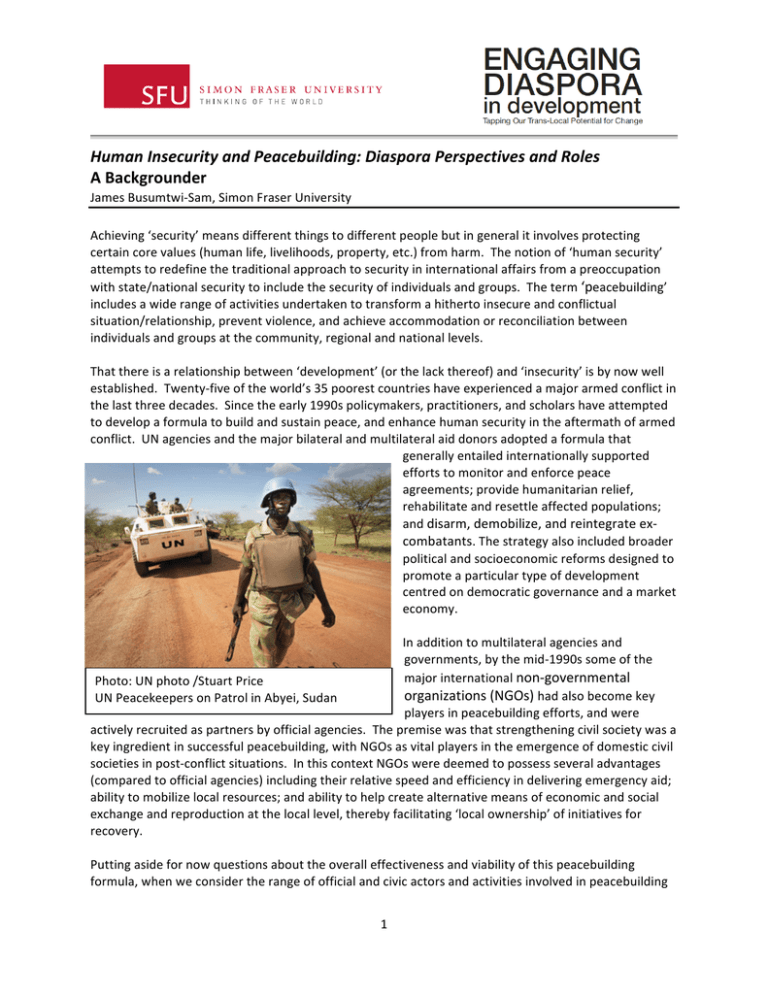
Human Insecurity and Peacebuilding: Diaspora Perspectives and Roles A Backgrounder James Busumtwi-­‐Sam, Simon Fraser University Achieving ‘security’ means different things to different people but in general it involves protecting certain core values (human life, livelihoods, property, etc.) from harm. The notion of ‘human security’ attempts to redefine the traditional approach to security in international affairs from a preoccupation with state/national security to include the security of individuals and groups. The term ‘peacebuilding’ includes a wide range of activities undertaken to transform a hitherto insecure and conflictual situation/relationship, prevent violence, and achieve accommodation or reconciliation between individuals and groups at the community, regional and national levels. That there is a relationship between ‘development’ (or the lack thereof) and ‘insecurity’ is by now well established. Twenty-­‐five of the world’s 35 poorest countries have experienced a major armed conflict in the last three decades. Since the early 1990s policymakers, practitioners, and scholars have attempted to develop a formula to build and sustain peace, and enhance human security in the aftermath of armed conflict. UN agencies and the major bilateral and multilateral aid donors adopted a formula that generally entailed internationally supported efforts to monitor and enforce peace agreements; provide humanitarian relief, rehabilitate and resettle affected populations; and disarm, demobilize, and reintegrate ex-­‐ combatants. The strategy also included broader political and socioeconomic reforms designed to promote a particular type of development centred on democratic governance and a market economy. In addition to multilateral agencies and governments, by the mid-­‐1990s some of the major international non-­‐governmental Photo: UN photo /Stuart Price organizations (NGOs) had also become key UN Peacekeepers on Patrol in Abyei, Sudan players in peacebuilding efforts, and were actively recruited as partners by official agencies. The premise was that strengthening civil society was a key ingredient in successful peacebuilding, with NGOs as vital players in the emergence of domestic civil societies in post-­‐conflict situations. In this context NGOs were deemed to possess several advantages (compared to official agencies) including their relative speed and efficiency in delivering emergency aid; ability to mobilize local resources; and ability to help create alternative means of economic and social exchange and reproduction at the local level, thereby facilitating ‘local ownership’ of initiatives for recovery. Putting aside for now questions about the overall effectiveness and viability of this peacebuilding formula, when we consider the range of official and civic actors and activities involved in peacebuilding 1 and conflict transformation, it’s surprising that to date the role of diaspora has received little attention. When attention is paid it usually has been to highlight the negatives in terms of how diasporic transnational networks help support and finance warring factions ‘back home’. Diaspora have largely been viewed with suspicion and mistrust by ‘home’ and ‘host’ country governments alike, and aside from a few notable exceptions, have not been seen as partners in peacebuilding. To be sure, some of these issues and concerns are valid, and it cannot be assumed that diaspora activities will always have a positive impact on peacebuilding in places of origin. Diaspora groups are not internally homogeneous but experience internal divisions and dissent; and such internal divisions may be intensified in some ‘conflict-­‐generated’ diaspora groups supporting different sides in a far-­‐away conflict. Historically also, some diaspora groups have been used by ‘host’-­‐country governments in covert operations against their ‘home’ governments. Perhaps the most well-­‐known example of a not-­‐ so-­‐covert operation was the abortive 1961 “Bay of Pigs” invasion of Cuba. More recently, in the aftermath of the September 2001 terrorist attacks in the USA, some diaspora organizations and networks were accused of being witting or unwitting conduits for the transfer of funds to support terrorism. By the same token, however, we should not assume that diasporic impacts on peacebuilding are always negative. They can be positive. My argument here is straightforward: to the extent that strengthening civil societies is seen as a key component in successful peacebuilding, then diaspora should be viewed as a unique facet or component of civil societies and should be more fully engaged. While traditional NGOs certainly are key actors, they are not the only important actors. Diaspora groups and networks, although often much smaller, less well established, somewhat more spontaneous and amorphous and often with less resources than many well established NGOs, are emerging as important actors in civil societies – in host countries, transnationally, and in countries of origin. Diaspora possess an important quality that differentiates them from traditional NGOs. They often combine strong links and attachments to the place of origin with experiences obtained in the place of settlement. Much more than NGOs, which are often firmly located in and associated with particular nations (usually developed Western nations) even though they operate internationally, contemporary diaspora are by definition linked or attached to two or more places/locations simultaneously. The issue isn’t just one of enhanced diasporic mobility across national boundaries spawned by globalization, but rather about the enduring connectedness they maintain between, and more importantly their embeddedness within, these places. Embeddedness (i.e., enmeshed in socio-­‐cultural norms, relations, and networks) is often cited in social capital research as a key factor generating trust and establishing and stabilizing expectations. In this respect, diaspora may possess several comparative advantages in peacebuilding (in addition to those NGOs are said to possess). They may have greater knowledge of and sensitivity to local customs and traditions in places of origin than traditional NGOs and official aid agencies. These customary norms and practices may be harnessed in support of peacebuilding and conflict transformation. Diaspora may also have a better and more nuanced understanding of the conflict and the broader context within which it has occurred that may enable them to ‘see’ things from a different perspective. And to the extent that contemporary diaspora maintain strong links to places of origin, and in some cases harbor aspirations of ‘return’, they may have a greater stake in seeing successful outcomes of peacebuilding processes. 2 Diaspora activities in peacebuilding and conflict transformation can engage the place of origin and/or of settlement in a variety of ways. The most obvious is channelling resources mobilized in host countries for humanitarian relief and to support a wider range of peace and human security related socioeconomic development activities (health, education, etc) in places of origin. In addition, diaspora civic, political, and diplomatic engagement can also have positive impacts on peacebuilding. In ‘host’ countries, for example, diasporic civic activism may help raise awareness of issues; and well-­‐organized interest articulation may influence public policy. To the extent that some diasporic groups operate via elaborate transnational networks linking members in several host countries, these activities may also have an impact transnationally and internationally. In places of origin, civic and political engagement may be direct, as when diasporic individuals return ‘home’ to become political office holders at various levels of government. Political involvement in places of origin may also occur indirectly through the fostering of dialogue among disputing parties, involvement in peace conferences, and assisting in election processes and monitoring. The perceptive reader will notice the rather frequent use of the word ‘may’ in reference to positive diasporic contributions. The reason is that not enough research has been done to provide definitive answers. Yet the evidence suggests that even though they have received little official and scholarly recognition, diaspora organizations, networks, and in many cases individuals, are already actively working in innovative and spontaneous ways to promote peace and transform conflict. The key challenge is to find ways to enhance the positive diasporic impacts on peacebuilding/conflict transformation and harness the untapped potential, while at the same time provide safeguards against the negative impacts. This is an issue that demands further research and fuller engagement by public agencies and civic organizations involved in peacebuilding. Learn more about creative ways diaspora from diverse parts of the globe are transforming human insecurity and peacebuilding at the public dialogue on July 13. Register here: http://www.sfu.ca/diasporas/] 3
